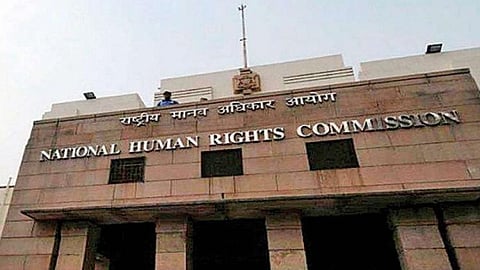

NEW DELHI: The National Human Rights Commission (NHRC) directed the Centre and State governments to ensure basic human rights of people affected by the Bhopal gas tragedy. The Secretary, Ministry of Environment, Forest and Climate Change, Government of India and the Chief Secretary, Government of Madhya Pradesh have been requested to appropriately dispose of toxic waste in the region.
The NHRC passed the order in response to a petition filed by Supreme Court advocate and noted human rights activist, Radhakanta Tripathy.
The petitioner, Tripathy, stated that four decades after the Bhopal gas tragedy, toxic waste continues to fester on the accident site and violation of residents' human right continues unabated.
As per the plea, it is estimated that more than 22,000 people died from MIC (Methyl Iso Cyante) exposure and more than half a million were maimed for life. Survivors have faced chronic health issues, three generations of birth defects, economic consequences, and ongoing groundwater contamination from unsafe disposal of poisonous wastes at the pesticide plant.
2nd December 2024 marked 40 years since the Bhopal gas leak disaster happened, one of the worst industrial catastrophes and corporate negligence cases in living memory, not only in India but worldwide, the plea said.
About 2 kilometres (1.24 miles) from the site of the tragedy in Brij Vihar colony, several houses have been locked up, with residents fleeing to the better parts of the city due to the toxic groundwater. The victims of Bhopal gas Tragedy are still seeking justice and accountability from the corporations that waged a genocide 40 years ago, Tripathy stated.
The Bhopal gas tragedy has scientific and environmental implications including human, health risks, and contaminated soil, water and air, the plea said.
It added that the tragedy also disrupted the ecosystems and threatening biodiversity and severely affected agriculture, hazardous chemicals damage plant cells, inhibit photosynthesis, stunt growth, and reduce crop productivity.
The release of toxins into the environment leads to bioaccumulation, where harmful substances enter the food chain and concentrate as they move up trophic levels, posing long-term risks to humans, wildlife and the environment at large, the plea stated.
Despite having numerous laws, government policies and judicial pronouncements, the people residing in surrounding areas suffer till date without basic human rights like safe drinking water, healthy environment and right to health. The Center and State governments have failed miserably to resolve the issues even after decades of the catastrophic incident, Tripathy alleged.
He has also requested the NHRC to recommend to the Center and the State to ensure the basic human rights of the victims of the gas tragedy and ensure potable drinking water, appropriate medical care and toxic-free environment for the people living in the nearby areas.
Acting on Tripathy's plea, the NHRC passed certain directions.
“This complaint be transmitted to the concerned authority for such action as deemed appropriate. The authority concerned is directed to take appropriate action within 8 weeks associating the complainant/victim and to inform him/her of the action taken in the matter,” the NHRC said in its order.